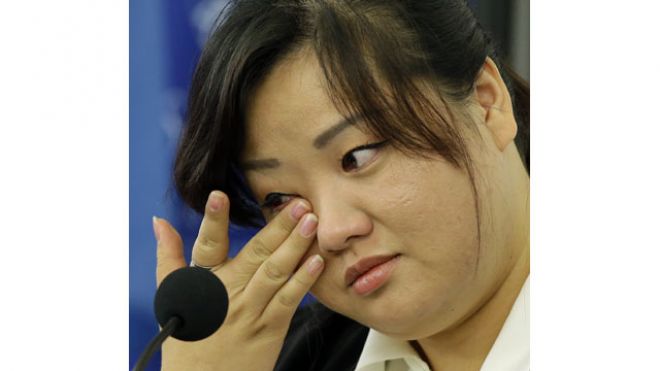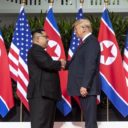

FILE – This Oct. 30, 2013 file photo shows Jin hye Jo wiping a tear as she testifies during a hearing of the United Nations mandated Commission of Inquiry about the human rights situation in the Democratic People’s Republic of Korea, in Washington. Her father was tortured in detention in North Korea and died. Her elder sister went searching for food during the great famine of the 1990s, only to be trafficked to China. Her two younger brothers died of starvation, one of them a baby without milk whose life ebbed away in her arms (AP)
A new United Nations report due out Monday will call for an international criminal investigation into human rights violations by the oppressive-leftist North Korean regime.
The three-member panel has found evidence of myriad crimes, such as “extermination,” crimes against humanity, against starving populations and a widespread campaign of abductions of individuals in South Korea and Japan.
Disgracefully, the communist-led China, the longtime North Korean ally, is reportedly prepared to block any proposal to refer the human rights violations to the International Criminal Court.
The three-member panel, headed-up by retired Australian judge Michael Kirby, was set up by the UN human rights body last March in what was the most significant step attempt to investigate evidence of severe and repeated human rights violations in the leftist, despotic regime.
Political prisons camps, or internment work-camps, have killed hundreds of thousands of people just in the 1990s, alone.
The report concludes that the testimony and other information it received, “create reasonable grounds … to merit a criminal investigation by a competent national or international organ of justice.”
But the North Korean regime is blatantly denying and not accepting the report’s findings.
A spokesman for North Korea’s U.N. Mission in New York told the AP: “We totally reject the unfounded findings of the Commission of Inquiry regarding crimes against humanity. We will never accept that.”
The commission, which conducted public hearings with more than 80 victims and other witnesses in Seoul, Tokyo, London and Washington, recommended that the U.N. Security Council refer its findings to the International Criminal Court in The Hague. They were not allowed into North Korea for the investigation.
Aside from opposition from China, another hurdle for the commission is that the court’s jurisdiction does not cover crimes committed before July 2002, prior to its statute.
But the commission recommends that the U.N. General Assembly and the Human Rights Council should extend the mandate of special human rights violations in North Korea, and proposes the Geneva-based council help ensure accountability, in particular regarding crimes against humanity, that would build on evidence and documentation the commission has investigated.
The commission will formally present its findings to the rights council on March 17, and the 48-member body will likely consider which of the report’s recommendations it wants to support.





